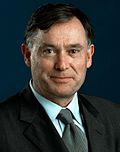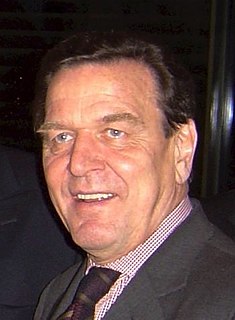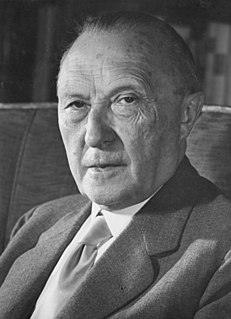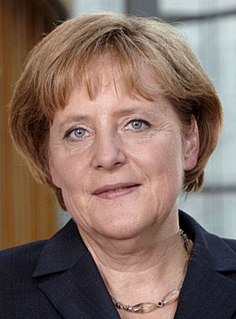| ||||||||||||||||||||
| ||||||||||||||||||||
| ||||||||||||||||||||
 |
|---|
| This article is part of a series on the politics and government of Germany |
|
| Foreign relations |
An indirect presidential election (officially the 13th Federal Convention) was held in Germany on 23 May 2009. The President of Germany is elected by the Federal Convention, which is made up of the members of the Bundestag and an equal number of members elected by the state parliaments. [1]

Germany, officially the Federal Republic of Germany, is a country in Central and Western Europe, lying between the Baltic and North Seas to the north, and the Alps to the south. It borders Denmark to the north, Poland and the Czech Republic to the east, Austria and Switzerland to the south, France to the southwest, and Luxembourg, Belgium and the Netherlands to the west.

The Bundestag is the German federal parliament. It can be compared to the chamber of deputies along the lines of the United States House of Representatives or the House of Commons of the United Kingdom. Through the Bundesrat, a separate institution, the individual states of Germany participate in legislation similar to a second house in a bicameral parliament.

A Landtag is a representative assembly (parliament) in German-speaking countries with legislative authority and competence over a federated state (Land). Landtage assemblies are the legislative bodies for the individual states of Germany and states of Austria, and have authority to legislate in non-federal matters for the regional area.
Contents
The incumbent Horst Köhler (supported by CDU/CSU and FDP) stood for reelection and faced Gesine Schwan (supported by SPD and Alliance '90/The Greens). [2]

Horst Köhler is a German politician of the Christian Democratic Union, and served as President of Germany from 2004 to 2010. As the candidate of the two Christian Democratic sister parties, the CDU and the CSU, and the liberal FDP, Köhler was elected to his first five-year term by the Federal Assembly on 23 May 2004 and was subsequently inaugurated on 1 July 2004. He was reelected to a second term on 23 May 2009. Just a year later, on 31 May 2010, he resigned from his office in a controversy over his comment on the role of the German Bundeswehr in light of a visit to the troops in Afghanistan. During his tenure as German President, whose office is mostly concerned with ceremonial matters, Köhler was a highly popular politician, with approval rates above those of both chancellor Gerhard Schröder and later chancellor Angela Merkel.

The Christian Democratic Union of Germany is a Christian democratic and liberal-conservative political party in Germany. It is the major catch-all party of the centre-right in German politics. The CDU forms the CDU/CSU grouping, also known as the Union, in the Bundestag with its Bavarian counterpart the Christian Social Union in Bavaria (CSU). The party is widely considered an effective successor of the Centre Party, although it has a broader base.

The Free Democratic Party is a liberal and classical liberal political party in Germany. The FDP is led by Christian Lindner.
The Left (successor of the Party of Democratic Socialism) indicated they might be prepared to support Schwan if the SPD agreed to be open to cooperation with the Left on the federal level, [3] but ultimately decided they would present their own candidate. [4] The party nominated party activist and TV actor Peter Sodann on 14 October 2008; and it was left undecided whether the party would support Schwan if Sodann was eliminated after the first round of voting.
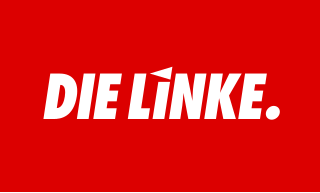
The Left, also commonly referred to as the Left Party, is a democratic socialist political party in Germany. It is considered to be left-wing populist by some researchers. The party was founded in 2007 as the result of the merger of the Party of Democratic Socialism (PDS) and the Electoral Alternative for Labour and Social Justice (WASG). Through the PDS, the party is the direct descendant of the ruling party of the former East Germany (GDR), the Socialist Unity Party of Germany (SED).

The Party of Democratic Socialism was a democratic socialist political party in Germany active between 1989 and 2007. It was the legal successor to the Socialist Unity Party of Germany (SED), which ruled the German Democratic Republic as a one-party state until 1990. From 1990 through to 2005, the PDS had been seen as the left-wing "party of the East". While it achieved minimal support in western Germany, it regularly won 15% to 25% of the vote in the eastern new states of Germany, entering coalition governments in the federal states of Mecklenburg-Vorpommern and Berlin.

Peter Sodann is a German actor, director and politician. He was the Left Party's nominee for the 2009 presidential election, but was not considered a serious candidate by the German media.
Frank Rennicke was nominated as the joint candidate of the NPD and its sister party the DVU.

Frank Rennicke is a German songwriter and ballad singer from Braunschweig in Lower Saxony. He is one of the key figures within the far-right extremism scene in Germany, and describes himself as a "national bard".

The National Democratic Party of Germany is a far-right and ultranationalist political party in Germany.

The German People's Union was a political party in Germany. It was founded by publisher Gerhard Frey as an informal association in 1971 and established as a party in 1987. Financially, it was largely dependent on Frey. In 2011, it merged with the National Democratic Party of Germany (NPD).
Following the Hesse state elections in January 2009, which strengthened CDU and FDP, and the Free Voters' promise to support Köhler, his reelection was seen as likely; however, CDU/CSU, FDP and Free Voters only had a slim majority in the Federal Assembly (50.16%), which made the election very competitive. In the end, Köhler was reelected in the first round of voting by 613 votes, which was exactly the minimum number of votes necessary. His nearest rival's, Social Democrat Gesine Schwan, received 503 votes making a second round unnecessary. [5] It has been seen by some as an important indicator for the federal elections in September. [5]
Free Voters in Germany may belong to an association of people which participates in an election without having the status of a registered political party. Usually it involves a locally organized group of voters in the form of a registered association (eV). In most cases, Free Voters campaign only at the local-government level, standing for city councils and for mayoralties. Free Voters tend to achieve their most successful electoral results in rural areas of southern Germany, appealing most to conservative voters who prefer local decisions to party politics. Free Voter groups are active in all German states.
